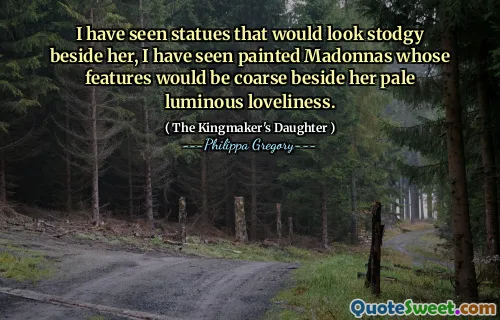
And – I think you know, don't you? – that I love you, Anne. I feel as if I have been living in a loveless world for too long. The last tender face I saw was my father's when he sailed for England. 'You do? Truly?' 'I do.' He rises to his feet and pulls me up to stand beside him. My chin comes to his shoulder, we are both dainty, long-limbed, coltish: well-matched. I turn my face into his jacket. 'Will you marry me?' he whispers. 'Yes,' I say.
[Markdown format]
This passage captures a profound moment of vulnerability and authenticity in a romantic relationship. The speaker’s admission of love is not merely a declaration but a revelation of emotional exhaustion and longing for genuine connection. The contrast between the loveless world she mentions and the tenderness she experiences in this scene highlights the rarity and value of authentic affection amidst emotional hardship. It also emphasizes the transformative power of love—the moment she feels seen and understood becomes a turning point for her.
The physical closeness, with the chin resting on the shoulder, symbolizes intimacy, comfort, and mutual understanding. The description of their bodies as "dainty, long-limbed, coltish" conveys their youth and compatibility, reinforcing the idea that this union is natural and destined. The emotional opening leading to the proposal suggests a moment of hope and new beginnings.
Throughout history and literature, such scenes underscore the human desire for connection and love as a vital antidote to loneliness and despair. The vulnerability expressed here reminds us that love often involves risk but also holds the promise of renewal and happiness. It’s a celebration of courage—taking a leap towards intimacy despite past pain, trusting that this love can bring meaning to their lives.
— book: (The Kingmaker's Daughter) — author: (---Philippa Gregory---)







